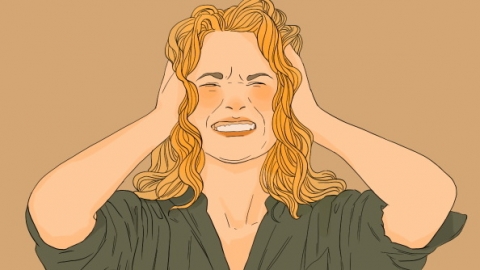What does it mean when someone hits themselves when they're angry?
Under normal circumstances, hitting oneself when angry may be caused by emotional displacement, loss of neural impulse control, impulse control disorder, anxiety disorder, borderline personality disorder, or other reasons. It is recommended to seek medical attention promptly, identify the underlying cause, and receive appropriate treatment under a doctor's guidance. Specific analysis is as follows:

1. Emotional Displacement: When feeling angry, individuals lacking healthy outlets may redirect their frustration toward themselves due to an inability to express dissatisfaction with others or situations appropriately, using self-hitting as a way to release emotions. Immediately removing oneself from the triggering environment and replacing self-harm with alternative methods such as punching a pillow or verbally expressing feelings loudly can help discharge emotions in a healthier manner.
2. Loss of Neural Impulse Control: Anger can trigger excessive activation of the sympathetic nervous system and impair prefrontal cortex regulation, leading to impulsive behaviors. Practicing the "emotion pause" technique regularly—such as counting down 10 seconds while taking deep breaths when feeling angry—can help delay neural impulse transmission and reduce impulsive actions.
3. Impulse Control Disorder: Individuals are unable to effectively regulate impulsive behaviors, making self-harm more likely during episodes of anger, often followed by regret. Patients may take medications such as lithium carbonate tablets, sodium valproate sustained-release tablets, or olanzapine tablets as prescribed, along with undergoing impulse control training.
4. Anxiety Disorder: Prolonged accumulated anxiety may erupt during anger, with self-harm becoming an extreme method to relieve internal distress, often accompanied by restlessness. Treatment may include medications such as paroxetine hydrochloride tablets, tandospirone citrate capsules, or lorazepam tablets under medical supervision, combined with psychotherapy.
5. Borderline Personality Disorder: Characterized by extreme emotional instability, individuals may resort to self-harm during anger to gain attention or alleviate psychological pain, often accompanied by unstable interpersonal relationships. Medications such as quetiapine fumarate tablets, risperidone tablets, or sertraline hydrochloride tablets may be used as directed, along with dialectical behavior therapy to improve symptoms.
In daily life, actively learning emotion management techniques, establishing emotional support signals with family and friends, and seeking help promptly during anger can be beneficial. Cultivating hobbies such as painting or physical exercise can enhance emotional regulation abilities and reduce the occurrence of impulsive behaviors.




